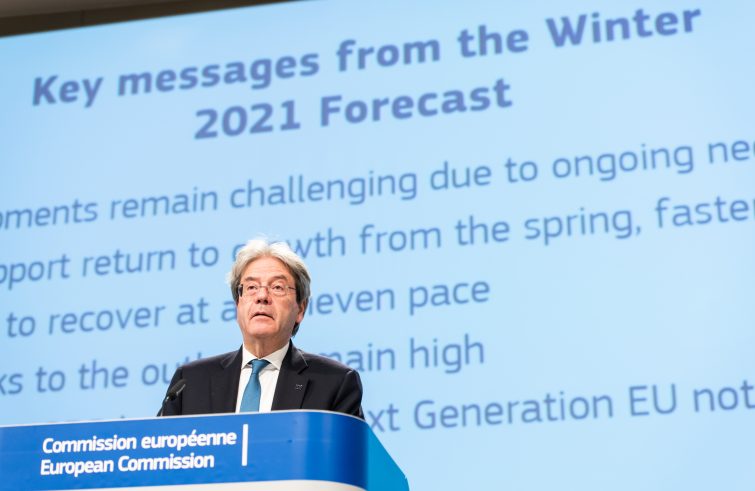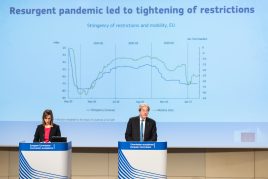
“Europeans are living through challenging times. We remain in the painful grip of the pandemic, its social and economic consequences all too evident.” Paolo Gentiloni, EU Commissioner for Economy, in his remarks for the presentation of the Winter 2021 Economic Forecast, depicted a gloomy scenario. Nonetheless, he added, “there is, at last, light at the end of the tunnel.” Gentiloni makes no concessions: uncertainty prevails, production systems and trade are in the grips of the pandemic and its consequences, and full recovery is not expected until the second half of 2022. Provided that the countries most affected by the health and economic crisis – notably Italy – succeed in making the most effective use of Next Generation EU funds.
 Impact of European funds. “As increasing numbers are vaccinated over the coming months, an easing of containment measures should allow for a strengthening rebound over the spring and summer”, said Paolo Gentiloni. The EU economy should return – under such conditions and barring new unforeseen events – to pre-pandemic GDP levels in 2022, “earlier than previously expected – though the output lost in 2020 will not be recouped so quickly, or at the same pace across our Union.” However, this forecast is subject “to multiple risks, related for instance to new variants of COVID-19 and to the global epidemiological situation,” as well as to developments in the global economy. On the other hand,
Impact of European funds. “As increasing numbers are vaccinated over the coming months, an easing of containment measures should allow for a strengthening rebound over the spring and summer”, said Paolo Gentiloni. The EU economy should return – under such conditions and barring new unforeseen events – to pre-pandemic GDP levels in 2022, “earlier than previously expected – though the output lost in 2020 will not be recouped so quickly, or at the same pace across our Union.” However, this forecast is subject “to multiple risks, related for instance to new variants of COVID-19 and to the global epidemiological situation,” as well as to developments in the global economy. On the other hand,
the impact of Next Generation EU “should provide a strong boost to the hardest-hit economies over the coming years,”
which “is not yet integrated into today’s projections.” The economic forecast published on Thursday 11 February projects that the euro area economy will grow by 3.8% in both 2021 and 2022. The forecast projects that the EU economy will grow by 3.7% in 2021 and 3.9% in 2022.
Five key messages. Commissioner Gentiloni clarified the following “five key messages” emerging from the forecasts. First, “the economic situation this winter remains challenging. Since the autumn, many Member States have reintroduced or tightened containment measures in response to the resurgence in infections and, more recently, to the spread of new, more contagious variants of the coronavirus. To be clear, these measures are necessary. But of course affect economic activity – although to a much lesser degree than in Spring last year.” Second, “because the recession in 2020 was not as deep as expected, and thanks to the breakthroughs regarding vaccines, we now project the EU economy will return to its pre-crisis GDP level already in 2022.” This forecast assumes that the current strict containment measures “will ease towards the end of the second quarter this year and then more markedly in the second half of the year.” Third,
the recovery “is set to be uneven across Member States.”
This reflects “differences in the structure of each economy and the relative importance of tourism and leisure activities” requiring people movement. Fourth point: uncertainty and risks are linked in particular “to the evolution of the pandemic, including the emergence of new variants and the success of vaccination campaigns.” Fifth: “this forecast – Gentiloni confirmed – does not take into account the potentially very significant positive impact of NextGenerationEU.”
 Data for Italy. As regards Italy’s economic activity, “real output fell by 8.8% in 2020, slightly less than expected owing to the momentum gained in the third semester (summer months)”, before slowing down following the second wave of infections in the fourth quarter of 2020 and the first weeks of 2021. Paolo Gentiloni was bound to add a note about his home country. Italy’s real GDP is projected to expand by 3.4%, to reach 3.5% next year. “But this forecast – he pointed out – does not take into account the full effect of the Recovery Fund” expected to ensure significant momentum. “We are facing potentially very significant positive impact.” The Economy Commissioner voiced
Data for Italy. As regards Italy’s economic activity, “real output fell by 8.8% in 2020, slightly less than expected owing to the momentum gained in the third semester (summer months)”, before slowing down following the second wave of infections in the fourth quarter of 2020 and the first weeks of 2021. Paolo Gentiloni was bound to add a note about his home country. Italy’s real GDP is projected to expand by 3.4%, to reach 3.5% next year. “But this forecast – he pointed out – does not take into account the full effect of the Recovery Fund” expected to ensure significant momentum. “We are facing potentially very significant positive impact.” The Economy Commissioner voiced
“confidence in the experience of the appointed Prime Minister”, Mario Draghi, “for an efficient and pro-European government.”
With regard to employment support measures and the redundancy fund, after a turn of phrase, Gentiloni ultimately stated: “at this stage we should avoid any premature withdrawal of supportive policies.”











